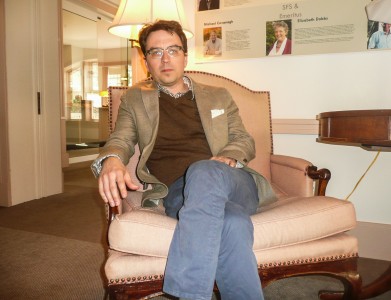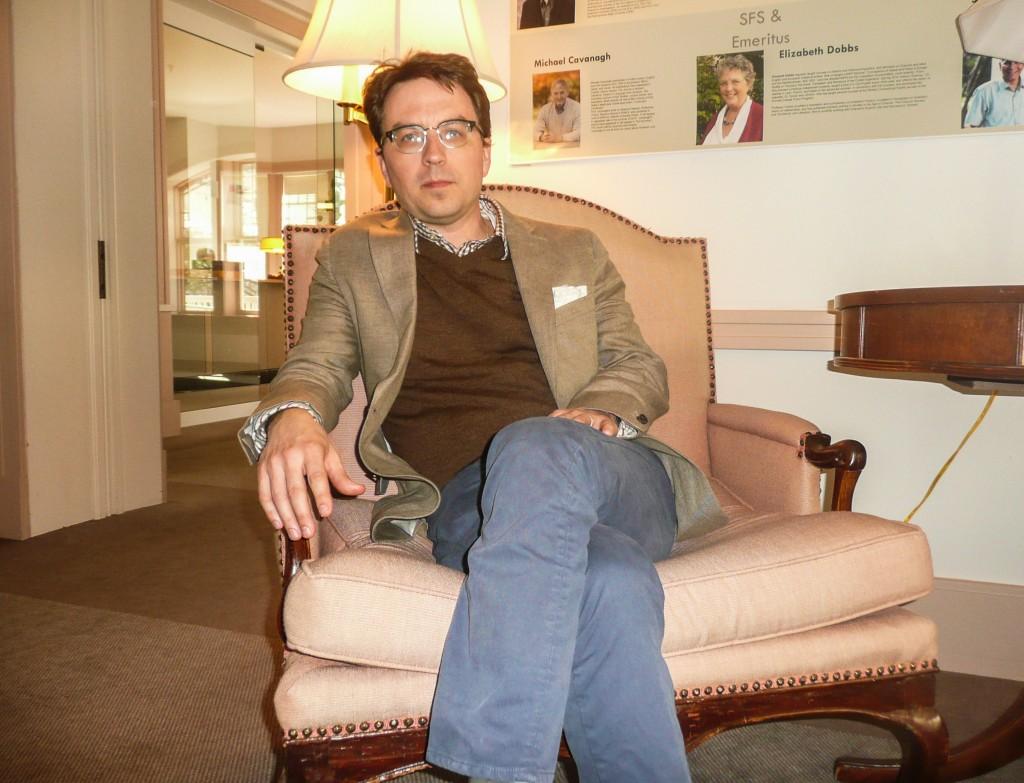Scott Samuelson ’95, Associate Professor of Philosophy at Kirkwood Community College in Iowa City, gave the keynote address of the Humanities Student Symposium on Monday, April 7. The S&B’s Carl Sessions ’15 spoke with Samuelson about his recently published book, the importance of diversity in philosophy and the need to see education as more than a means to economic ends.

Photo by Carl Sessions.
Your book “The Deepest Human Life” was published by University of Chicago Press on Thursday, April 3. There is a multiplicity of introduction to philosophy books. How did you come up with a unique take on the subject?
I wanted a book that did several things simultaneously. I wanted a book that on the one hand lets you learn about the history of Western philosophy, but is also a thematic introduction to philosophy—what are some of the main questions that philosophy asks? The final part is a way of relating philosophical questions to people’s lives—to my own, to my students, to other people—but even to the philosophers themselves … The subtitle is “An Introduction to Philosophy for Everyone,” which I take is going to normally mean to people that this is for non-specialists. But I hope that the subtitle has a slightly subversive meaning which is that it is also for philosophers. They too can use a little reminding of what philosophy is about. They, too, often forget what it is.
What kind of differences do you see between students at Kirkwood and Grinnell?
What I love about a place like Grinnell is that there is a kind of intellectual zeal—that people come at things with interest and excitement. That’s one of the beauties of this Humanities Symposium, you can tell that people approach it with vigor … You can’t take for granted that same kind of intellectual zeal in a community college. But the interesting thing is that it can be awoken. A student may come in initially indifferent to the subject, but then sometimes the light goes on. That can be quite exciting. You feel like you are bringing people into the subject. The other thing is that you get every type of person—the complete range of humanity. I’ve had some just absolutely brilliant people as students … You get super smart people, you get people who are elderly, middle aged, more traditional college age and you get high school kids. You get people whose reading abilities are low, people from all over the world, working-class people. In any given classroom there’s not a kind of expected homogeneity of thought. I’m not saying there’s no diversity at Grinnell, but at Kirkwood you walk in and there’s some pious Sudanese Muslims, people from inner-city Chicago, a kid from India who bottomed out from the University of Iowa, children of farmers—it’s incredibly diverse there. So you really have to work to create some rapport among the students.
Philosophy is oftentimes elitist and overly-specific. How do you avoid these tendencies while teaching?
One thing that inspired the book was that I tried to find ways of making philosophy come alive and be meaningful to real people. And by real people I don’t mean just for Sudanese refugees and farmers, but for all of us—I’m no exception. These things matter to all of us quite deeply. It’s made me want to focus philosophy on the way that philosophy interacts with the world. One idea of philosophy is that it looks on how the world is going on and tries to describe it as accurately as possible. But that’s not the case. We’re enmeshed in the world. Our ideas transform the world and our relationship to it. Bringing philosophy back to that seems really important. And that’s what the founder of Western philosophy, Socrates, was known for. He was getting into people’s lives and trying to work on their ideas in a way that made a difference. Every day he was talking in the marketplace of Athens.
An interesting issue that came up during your talk was the notion that colleges are appearing to act more and more like companies and students are treated more like consumers. What problems emerge from viewing education in this manner?
It’s hard to give a full account of why it’s going on, but it certainly is and it seems deadly at some level to the liberal arts and education more generally. It’s important not to be naïve about it. Money is important and our economy and higher education systems are linked. But to collapse education into the commodified economy seems to be really wrong for lots of reasons. One is that I don’t think it’s even successful on its own terms. If you want to have the kinds of skills that are not going to be automated away, then you need to be able to think using the kinds of skills that are developed in the liberal arts. And those skills can’t be downloaded. They have to be practiced and learned. Even if I just simply want to get a job and move up the ranks at IBM, I still would suggest getting a liberal arts education. But beyond that, I think that it’s reductive to think that the purpose of an education is solely to rise [through] the ranks at IBM. There needs to be a social investment in education—a public investment—and in order to do that we need to have ends that are not tied to the economic realm. If you’re only getting an education for the economy, that really is your business and you should pay for that yourself. But if we believe an education is something worth investing in for the public more widely, if we believe in K-12 education and public universities and even private colleges, then we need to have a vision that is more than the economy. And I tried to tie that into the idea of citizenship in my talk: a sense of how you participate in a richer way in the society around you that brings you a kind of happiness. That’s an important part of education, and so to turn the student completely into a consumer is to undermine education.
How do you think this kind of citizenship can be developed at college outside of classes?
First and foremost, I think the education itself should be seen as part of citizenship. Education is an important part of the public sphere. Being at college is being a part of the public—you’re rising beyond your immediate family and self to join with a group of people in an important, collective endeavor. One of the beauties is that because students have been given the freedom to rise outside of society for a moment, they’re in a powerful place to reflect on society. Student movements are often a big part of political change. So I think that it’s important for students to remember that they do occupy a special place in society and they have a kind of obligation to stand up and give voice to their youthful idealism. You’re not just here to get a job, you have a place in relation to society that is important and has been momentous at times all over the world.





























































